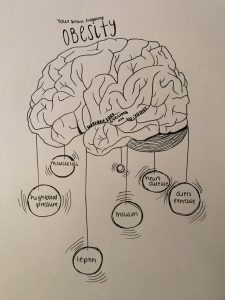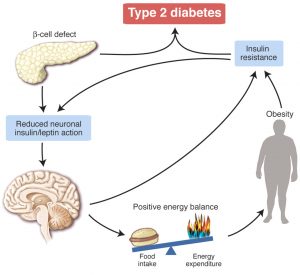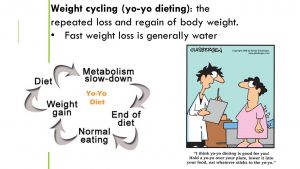
Understanding Obesity: What Happens in Our Brain
One of the more common disorders that faces the public today is one that tends not to be thought of: obesity. Obesity involves having an excess amount of body fat but is much deeper than initially realized. There are many risk factors that are associated with being obese such as higher blood pressure and cholesterol, diabetes, increased risk of heart disease, and many more. There is a way to reverse some of the changes that are coupled with obesity by losing weight but doing so may be much harder than you think.

Image 1: A small schematic that shows the way that weight can be gained in association with insulin and leptin receptors in the brain and throughout the body. Although very simplified, it portrays the message.
Source: http://science.sciencemag.org/content/307/5708/375
Often not thought of when dealing with obesity, the brain plays a large role in the disorder. Certain diets influence brain structure, causing hypothalamic swelling and changes in receptors. Two receptors play a pivotal role in obesity: leptin and insulin. These two receptors, also found throughout the body, are known to be apart of appetite suppression pathways. The dysregulation and inhibition of these receptors can lead to overeating, as there are no signal being sent or received that an individual is full. Eventually the energy that is being consumed isn’t needed by the body and is stored in fat, leading to weight gain and eventual obesity. Obesity is a complex disorder that researchers are still trying to understand. Right now, we know that a way that aids individuals is losing weight, but there are difficulties associated with that as well.
What is Weight Cycling?
Weight cycling is the repeated cycles of weight loss and eventual gain back. Many people who are attempting to lose weight end up falling into this cycle. In a normal brain, leptin is released from adaposity and acts as a signal to stop eating, binding the in brain. As well know, that doesn’t happen in obesity making it hard to lose weight by stopping eating so much.

Image 2: The infographic shows the problem that just American’s have with weight cycling and how many people truly have issues losing weight.
Source:https://medium.com/@chris.tsai/why-weight-cycling-is-the-pivotal-problem-of-obesity-e294006d2e54
One of the ways that people are encouraged to lose weight is by exercising and of course dieting. There is an issue with dieting however, it is very easy to gain the weight back one lost. When this becomes a pattern is when it’s issue and can lead to many problems in an individual’s health. Another term for this is the yo-yo diet and is a bigger issue than you might think.
“Yo-yo” diet
One of the biggest causes of yo-yo diets, or weight cycling, is binging. Once an individual has lost weight, this restriction of enjoyable food often higher the reward, they are susceptible to binge. Often the regaining of weight when dieting can be due to:
- The food they are surrounded by
- Response to new food supply
- Adaptive thermogenesis (the amount of calories that are burned lowers with weight loss and often is paired with an increased drive to eat food)

Image 3: A depiction of how the yo-yo diet can happen.
Source: https://slideplayer.com/slide/8926242/
This being said, there are adverse side effects that can occur when weight cycling. These include:
- Gut dysfunction
- Psychological frustration
- Muscle loss
- Fatty liver
- Many of the symptoms that are associated with obesity
Overall, it comes down to this; some suggest that losing weight but not being able to keep it off may be worse than being overweight. Although, yes, weight loss can reverse many of these effects, unless it stays off your body is just under constant stress because of changes in major systems.
Where do we go from here?
There is evidence that the yo-yo diet, or weight cycle is bad for an individual’s health. But should that stop someone from attempting to lose weight? That depends on many intrinsic factors that I can’t tell you about. All information considered, it is important to know the risks that are associated with weight cycling when attempting to lose weight, no matter what your size is. That is the only way that you can make an informed decision for yourself to eventually be the best you that you can be.
Sources:
https://www.todaysdietitian.com/newarchives/0517p18.shtml
https://www.ncbi.nlm.nih.gov/pubmed/7741844
https://www.mensjournal.com/health-fitness/yo-yo-dieting-what-it-and-how-it-can-wreck-your-body/